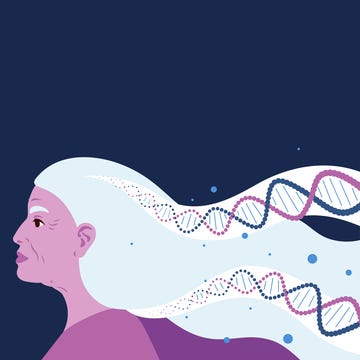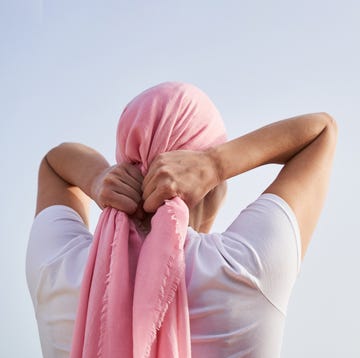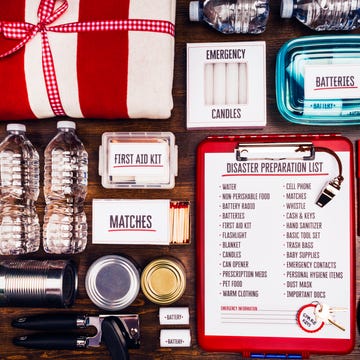Anyone who’s ever had cystitis will be all too familiar with the burning sensation that heralds an infection and that ever-present, often totally unproductive, urge to pee. If you’re one of the lucky few who have never been afflicted, cystitis is a razor-sharp, painful infection of the lower urinary tract, which is usually (but not always) resolved with antibiotics.
‘Simple bouts of cystitis often respond to a short course of antibiotics,’ says urology specialist nurse Helen Lake of The Urology Foundation. ‘However, in a significant number of women, symptoms come back quickly, which may signify that the course of antibiotics wasn’t long enough or the bacteria was resistant to the antibiotic given. Urinary tract infections can be incredibly painful, and no one can see how much it hurts.’
There are other reasons why antibiotic treatment might fail, too. ‘Sometimes the “bug” isn’t there in sufficient quantities to be classed as a significant infection – despite women often having the symptoms of a UTI,’ says Helen. ‘Or the result of a urine test may say “no growth” despite ongoing symptoms. It may be that having been told to drink, the urine is so dilute that the bacteria isn’t showing up. Or if they’ve been on antibiotics previously, the infection has been “partly treated” and will show up as a negative.’
For more than 1.6m women in the UK, UTIs become chronic, and sufferers are dogged by debilitating pain. ‘UTIs are classed as “recurrent” if they occur twice in six months, or three times in a year,’ says Helen. As well as embedded infections that haven’t been treated, there are several other risk factors: hormonal changes; different types of contraception such the diaphragm or even the coil; or medical conditions that mean the bladder fails to empty completely. ‘The anatomy of women plays its part, as the bacteria can easily migrate from anus to urethra,’ says Helen. Then there’s constipation, dehydration, low immunity that means a greater susceptibility to UTIs and trigger factors such as sexual intercourse.
How does the menopause make you susceptible to UTIs?
‘During the perimenopause, menopause and post-menopause, oestrogen levels drop and this affects your bladder and vagina,’ says Helen. ‘The tissues thin and become drier and less protected, making it easier for bacteria to travel up into bladder. Oestrogen can affect levels of lactobacillus in the vagina – good levels maintain a bit of acidity and can stop bacteria taking hold.’
Why are UTIs so painful?
‘The urinary tract is very sensitive and when the lining becomes inflamed, it creates that burning and stinging “broken glass” feeling,’ explains Helen. ‘The body tries to send signals to your bladder to bear down and expel the infection, which is an intense and unpleasant feeling. Pain can often be felt in the legs, tummy and back due to nerve connections.’
If pain is severe in the lower back and you also have nausea and a temperature, she adds, the infection could involve your kidneys, so make an urgent appointment at your GP.
In rare cases, UTIs can lead to serious, life-threatening sepsis, which is extreme reaction to infection. Older adults, infants and people with catheters and long-term conditions are most susceptible – but fit and active people can also be affected. Keep a sharp eye on symptoms and if you notice any changes, seek urgent medical advice.
How do you treat UTIs? Helen has this advice:
Drink plenty of fluids, rest and apply heat such as a hot water bottle.
Try cystitis relief products that contain sodium or potassium citrate – these can be helpful in relieving that burning feeling.
Take over-the-counter painkillers such as paracetamol or ibuprofen.
Seek antibiotic treatment, available in your local pharmacy if your symptoms don’t resolve. No sample is needed – but you should have two or more symptoms of a UTI.
If your symptoms persist despite treatment, see your GP. Some UTIs require a longer course of treatment.
To prevent UTIs:
Wipe from front to back after peeing.
Pee after sex.
Don’t rush on the toilet – ensure your bladder is empty.
Avoid synthetic underwear and perfumes in the vulval area.
Supplement with D-mannose, available in chemists – a natural sugar that some research suggests may stop some bacteria adhering to bladder lining. You could also try a cranberry supplement which may help.
If you’ve noticed sex triggers cystitis, your GP can prescribe you a single-dose antibiotic to take after intercourse.
If you’re experiencing recurrent UTIs, your GP can prescribe a low-dose, long-term antibiotic, used as a preventer, which can be helpful.
If your symptoms are related to the menopause or following the menopause ask your GP about topical oestrogen pessaries or creams, which help with vaginal dryness.
Hiprex (methenamine hippurate) is a urinary antiseptic and offers a nonantibiotic alternative. Ask your GP about this treatment.
Sometimes, much longer courses of antibiotics are necessary. If you’re struggling with recurrent or chronic UTIs, ask your GP to refer you to specialist urology care.
The Urology Foundation has a support service and helpline: 0808 801 1108













